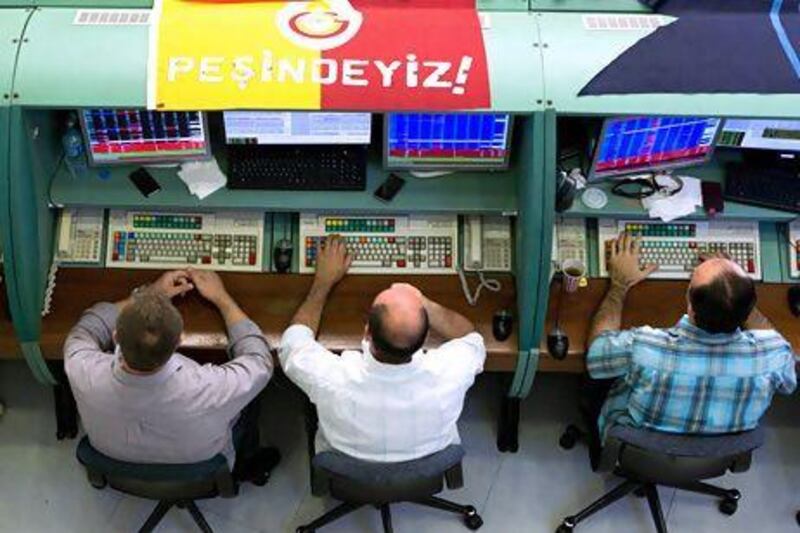Turkey's stock market has shed 58 billion liras (Dh113.25bn) of its value since protests began, triggering a double whammy on asset prices and currency depreciation for foreigners who worry about a political risk premium hike.
"Investors are very worried about an increase of political risk premium in the country," said Burak Isyar, an equity analyst at the Istanbul-based Burgan Yatirim Menkul Degerler.
"They will be following developments as not the whole picture is visible at this stage."
The Borsa Istanbul Exchange's market capitalisation has been wiped to 461bn liras from 519bn liras on May 31, when Turkish police first fired tear gas on thousands of demonstrators seeking to halt the construction of a shopping mall on Istanbul's Gezi Park. Turkey's currency, the lira, has depreciated from 1.86 per dollar on May 31, to touch 1.90 per dollar on Tuesday.
The benchmark National 100 Index has dived 10 per cent, while the cost of insurance against Turkish debt rose 41 basis points to 172 - heading towards a 10-month high.
Moody's Investors Service, which upgraded Turkey by one notch to Baa3 before the protests began, warned on Monday over a potential hike in credit risk if protests continued.
"These political disturbances become increasingly credit-negative the more they intensify and the longer they continue because they heighten the government of Turkey's … susceptibility to balance-of-payments risks through reduced tourist arrivals and portfolio investment inflows, an important source of current account funding," the ratings agency said on Monday in a report.
Tim Ash, the head of emerging market research at Standard Bank in London, said "depending on how long this goes on, if there is no turn around on the political front, and the economy begins to deteriorate", Turkey could see its investment grade rating effected.
Recep Erdogan's actions are a marked shift from the market-friendly position AKP (Justice and Development Party) has been known for among investors.
"Time after time, they responded to market concerns and pressure by moderating policy, but something is different this time and their rhetoric is uber market unfriendly - they don't seem to care," said Mr Ash.
"It is strange that they are somehow trying to pin the blame for the protests on markets, and market participants, including foreigners."
Mr Ash was referring to Mr Erdogan's attack on speculators on Sunday, when he allegedly accused them of holding back Turkey's economic growth through the adoption of high interest rates.
At a rally in Ankara, Mr Erdogan tried to deflect the demise of the financial markets on an "interest-rate lobby".
"The lobby who has exploited the sweat of my people for years. You will not from now on. If we catch your speculation, we will choke you. No matter who you are we will choke you," Mr Erdogan said.
"I am saying the same thing to one bank, three banks, all banks that make up this lobby. You have started this fight against us, you will pay the high price for it." On Tuesday, the Central Bank said it would tighten monetary policy and was ready to act directly into the currency market if necessary.
The measure would reduce Turkish lira liquidity into the banking system, bringing up costs and rates with it.
"It was important, necessary and expected," said Christian Maggio, a senior emerging markets strategist at TD Securities in London. "They haven't assured markets. They won't stop this (Lira depreciation) by announcing something and doing some FX sales. They have just started."
The benchmark bond yield rose to above 7 per cent yesterday, the highest level since November, on expectations the central bank will raise funding costs further.
Average funding costs rose to 4.98 per cent on Tuesday from 4.68 per cent on Monday.
Yesterday, the central bank governor Erdem Basci said economic growth, which was 3 per cent year-on-year in the first quarter, is expected to pick up in the second quarter and inflation will start to fall from August.





